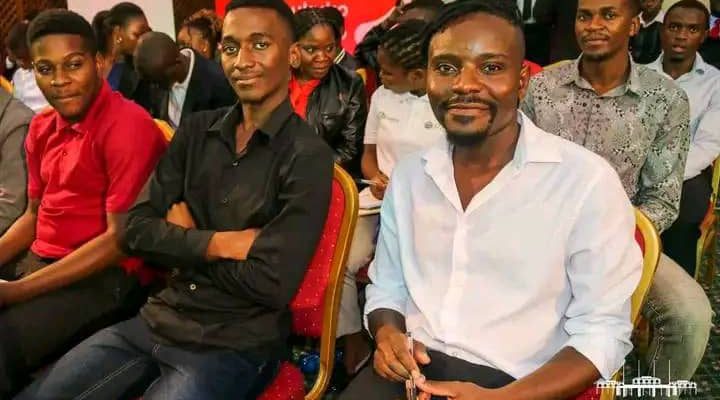
A video of Patience Namadingo has taken social media by storm. The popular Malawian musician delivered a striking speech at Sanjika Palace on February 27, 2025.
His address touched on governance, leadership, and the frustrations of Malawian citizens.
In the footage, Namadingo’s excitement was evident. He expressed how honoured he felt to be among young people invited to speak with President Lazarus Chakwera.
He recounted the joy he felt upon receiving the invitation. Standing before the audience, he began by acknowledging the significance of the occasion.
President Chakwera, listening attentively, interjected with a remark affirming the importance of the day. A young woman in the crowd then made a request.
She asked Namadingo to speak in vernacular, hoping for wider comprehension. In response, he acknowledged the request but stood firm in his choice of English.
He explained that fluency mattered to him, as he wanted to express himself without hesitation.
“I will speak Chichewa,” he said, “but I am very fluent in English. I need to flow—ndisamaganize kuti ndikufuna kuyankhula chani.”
Shifting the focus, Namadingo introduced a critical topic—governance. He cited the World Bank’s four pillars: accountability, transparency, participation, and one that momentarily escaped his memory.
His message was clear—Malawians demand accountability and transparency from their leaders. He pointed out that many people lack a true sense of ownership of their country.
Speaking on behalf of frustrated Malawians, he described the widespread dissatisfaction among citizens.He declared that millions outside the palace walls were angry. “If you ask them what the problem is,” he stated, “the answer will be governance.”
Turning to his fellow youth, he urged them to seize the rare opportunity.
“This chance will not come again,” he warned.
He encouraged them to ask meaningful and difficult questions. He cautioned against wasting time on trivial matters.
Namadingo then reflected on his attachment to Malawi. At 34 years old, he affirmed that he had no other home but this nation.
Yet, he admitted to experiencing mixed emotions about its current state. First, he felt confused. Second, he felt disappointment. Finally, and most importantly, he held onto hope.
Without hope, he declared, the country would be lost. He then directed his message to Malawi’s political leadership. He insisted that leaders must inspire their people.
Quoting the Qur’an, he reminded them that leadership should uplift the masses. However, he questioned whether Malawian leaders were fulfilling this duty.
He then touched on a troubling trend in politics. He criticized how Parliament had become a pathway to wealth.
Young people now aspired to become Members of Parliament or ministers—not to serve, but to get rich. He exposed the contradiction between public officials’ salaries and their lavish lifestyles.
“With a salary of less than MWK 3 million,” he asked, “how do they afford expensive cars and luxurious homes?”
Leaving the question unanswered, he added, “Your guess is as good as mine.” He then raised another urgent concern—the mass exodus of Malawian youth.
He shared his observations from his travels abroad. In the United States and the United Kingdom, he met many Malawian youth desperate to leave their country.
“I cannot be proud to live in a country,” he lamented, “where every youth I meet wants to run away.”
Drawing wisdom from the Bible, he referenced Luke 7:22. He recalled how John the Baptist asked Jesus if He was truly the one they had been waiting for.
Applying this to President Chakwera, he suggested that results should speak louder than explanations. Namadingo acknowledged the significance of the gathering.
For the first time in over four years, the President had invited young people for such a dialogue. From the depths of his heart, he implored his fellow youth to be bold.
He urged them to ask the difficult questions without fear. He reminded them that this opportunity would not come again. Looking ahead, he turned his attention to the upcoming elections. He reminded President Chakwera that the polls were only six months away.
“You might not be the man sitting in that seat after six months,” he told him.
If Chakwera secured another term, Namadingo hoped this discussion would lead to meaningful change. If not, he feared that the gathering would have been nothing more than a performance. Closing his speech, he expressed gratitude.
“Thank you so much, Your Excellency,” he said.
“God bless you.”
His speech has since sparked widespread debate. Some have commended his courage in addressing the President so boldly. Others, however, have dismissed his speech as mere grandstanding.
Regardless of the reactions, one thing remains certain. His words have reignited national conversations on governance, leadership, and the future of Malawian youth.














